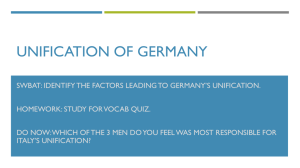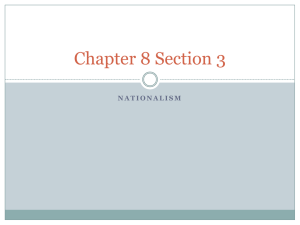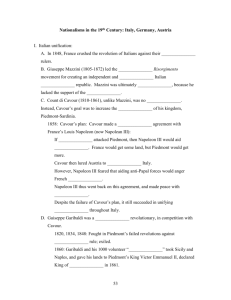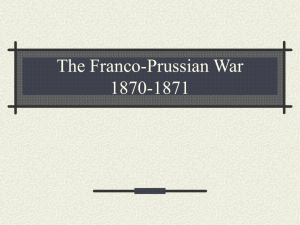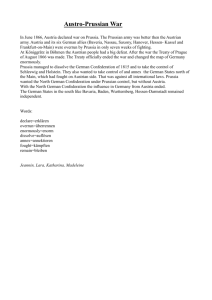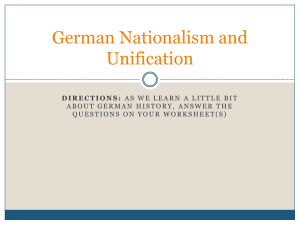4U STEPS TO ITALIAN UNIFICATION, 1856-1870
advertisement
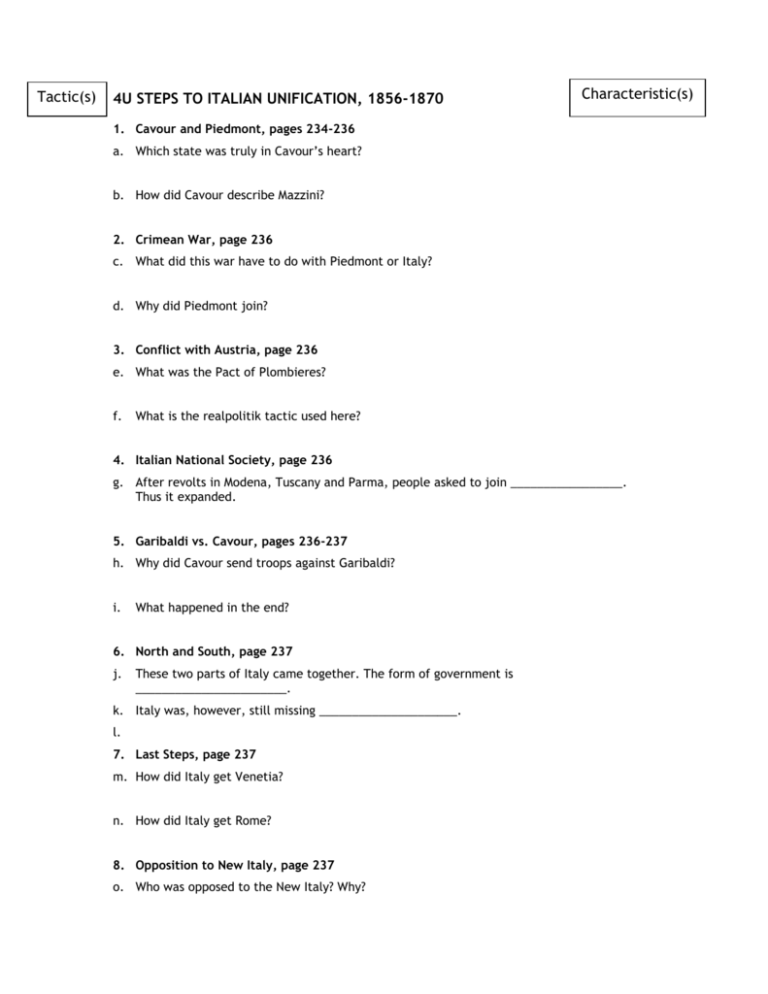
Tactic(s) 4U STEPS TO ITALIAN UNIFICATION, 1856-1870 Characteristic(s) 1. Cavour and Piedmont, pages 234-236 a. Which state was truly in Cavour’s heart? b. How did Cavour describe Mazzini? 2. Crimean War, page 236 c. What did this war have to do with Piedmont or Italy? d. Why did Piedmont join? 3. Conflict with Austria, page 236 e. What was the Pact of Plombieres? f. What is the realpolitik tactic used here? 4. Italian National Society, page 236 g. After revolts in Modena, Tuscany and Parma, people asked to join _________________. Thus it expanded. 5. Garibaldi vs. Cavour, pages 236-237 h. Why did Cavour send troops against Garibaldi? i. What happened in the end? 6. North and South, page 237 j. These two parts of Italy came together. The form of government is _______________________. k. Italy was, however, still missing _____________________. l. 7. Last Steps, page 237 m. How did Italy get Venetia? n. How did Italy get Rome? 8. Opposition to New Italy, page 237 o. Who was opposed to the New Italy? Why? Tactic(s) CHY 4U STEPS TO GERMAN UNIFICATION Read pages 238 to 241 and fill in the blanks. Characteristic(s) 1. Prussia leads German unification drive because _____________ doesn’t want to break up its empire. _____________ has strong executive power. 2. 1862 Wilhelm I chose _____________ as first minister – Prussian patriot – during a crisis between king and parliament over the military _____________. Bismarck believes in monarchy and reform from above. 3. Bismarck solves the budget dilemma by saying that all powers not specifically given to parliament are automatically given to the _____________ (royal power over constitution). Thus taxes were collected in order to strengthen the _____________. 4. Quote: Prussia’s expansionist foreign policy was to be achieved by “_____________.” 5. 1864 Join with Austria against _____________ to get Schleswig and Holstein (German speaking – quick defeat). Strategically it is interesting that Bismarck is willing to unite with _____________, a potential rival and future enemy. 6. Bismarck’s nationalism was able to convince Prussian __________________________ alike that strength and unity were desirable goals. Bismarck knows that not everyone agrees, particularly Catholic Bavaria in the south which has more loyalty to _____________. 7. Preparation for the ultimate defeat of Austria was undertaken by training the army and isolating Austria. 8. Diplomacy: isolate Austria by alliance with _____________ (to get Venetia); keep France out of things with promises of territory; tell Russia that Prussia will help it get its foot into the Mediterranean; he figured _____________ won’t intervene if its empire was left alone. 9. Strategy for war with Austria: win quickly but limit the war – don’t want other nations to get involved or to lose territory at a negotiating table. 10. 1866 _____________ Austro-Prussian War over the issue of Schleswig-Holstein. Seven Weeks War. Bismarck said not to take over the entire Austrian Empire – just defeat it. 11. 1867 North German Confederation created including _____________ German states. Prussian king became president and the Prussian constitution became law. 12. With Austria weakened, the _____________ took place in the Austrian Empire: Hungarians won some of their demands for autonomy and Austria-Hungary, a dual monarchy was created. 13. Effect of Seven Weeks War on _____________: it feared a strong united Germany on its border. Thus Bismarck knows he must defeat it in order to bring together the northern and southern German states. 14. Bismarck needed to create a crisis to scare southern German states into unification: 1870 issue of the Spanish succession: France fears _____________ ruling on both its borders. Bismarck had the Ems Dispatch written to make it look like France and Prussia were insulting each other. He released it to the _____________ knowing that it would stir up immense nationalism in France. It did and France attacked first making Prussia look like the innocent victim. 15. 1870-71 __________________________: defeat France in a few months resulting in a major shift in the balance of power. 16. Last step: north and south join to form German Empire proclaimed from _____________. Prussian King becomes German _____________. 17. Paris Commune: workers resisted disarming. Democrats and socialists won municipal elections but the provisional government of France sent in the _____________. They fought for a week, resulting in the death of 20 000 supporters of the commune. This made the rest of Europe fear the appeal of socialism to the working class.
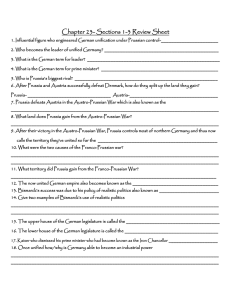

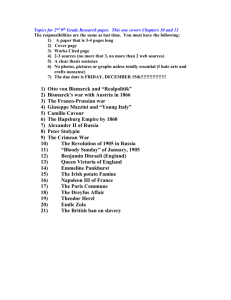
![italiangermanunifi[1]](http://s3.studylib.net/store/data/009628182_1-f43ba01c4570a79b659d367a2bc477b0-300x300.png)
